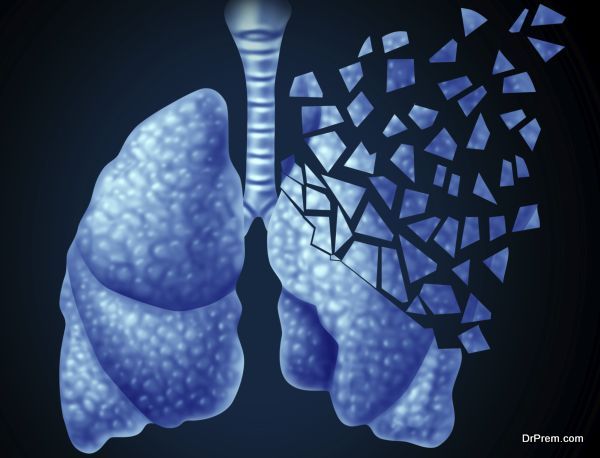Crackling in the lungs is a condition that is caused by fluid build-up inside the lungs. These crackling sounds are usually noticed during medical examinations. While many consider these sounds to be a result of a lung infection during a cold or flu, there are many other serious conditions that may cause the condition. Given below are 8 common conditions that can give rise to crackling sounds in the lungs. As such, it is imperative that one undergoes a detailed medical examination to ascertain the cause for the condition before treatment is started.
Blockages

In some cases, the nasal passage and the airways may be blocked due to foreign contaminants. When this happens, the lungs are placed under excess pressure and eventually collapse, leading to a condition called atelectasis (airless lungs). Crackling sounds usually accompany the symptoms of this condition.
Lung Infection

Another common cause for crackling in the lungs is lung infection, usually caused by viruses. Viral infections can cause the airways to get blocked, leading to irritation and inflammation. As the body builds up white cells in the lungs as a natural mechanism to fight off the infection, fluids as well as other by products start accumulating in the organ, thereby causing the crackling sounds when the person breathes.
Pneumonia

A viral infection of sorts, pneumonia causes the air sacs in both lungs to inflame. The crackling sounds one hears while breathing may be considered as a warning signs for pneumonia, especially if it is accompanied by other symptoms like fever, coughing, headache, fatigue, chest pain, perspiration and breathlessness. As such, the individual would need to visit the doctor to get the condition treated with right away.
Bronchitis

Caused by a viral infection, bronchitis affects the bronchial tubes, inflaming them considerably. Acute bronchitis is usually caused by common cold or flu, and affects the respiratory tract, thus causing the crackling sounds. Chronic bronchitis, usually caused by smoking, causes irritation and inflammation in the bronchial tube lining, also causing crackling sounds to arise when the person breathes.
Interstitial Lung Disease

Interstitial lung diseases deal with disorders pertaining to the air sacs and tissues in the lungs. Conditions like sarcoidosis, rheumatoid arthritis as well as exposure to certain chemicals like asbestos can lead to interstitial lung diseases. These diseases and disorders in turn, cause scarring in the lungs (lung fibrosis). With time, fluid gets trapped in the scarred tissues, this causing crackling sounds.
Asthma

Asthma is a disorder that causes the airways to swell and produce more mucus. This makes it harder for the person to breathe, thereby causing wheezing as well as a crackling sound wen coughing or breathing. While asthma is a minor irritant for some, it is a big problem for others, often leading to life threatening attacks.
Obstructive Pulmonary Diseases

Like asthma, which is an obstructive lung disease, other conditions like cystic fibrosis can cause wheezing and crackling sounds when a person breathes or coughs. Obstructive lung diseases affect exhalation, thereby leading to the build-up of carbon dioxide along with the fluids and other by-products inside the lungs. Continuous build up would lead to scarring of the lung tissue, leading to lung crackles.
Failure to treat obstructive lung conditions would eventually lead to a more severe condition; bronchiectasis which, worsens the crackling sounds in the lungs as more fluid accumulates in them.
Heart Failure

In some cases, lung crackles can be caused by heart disorders or heart failure. A heart attack will usually cause the muscles in the heart to weaken. When this occurs, the natural pumping process is affected, leading to blood and other fluids backing up into the lungs. Continuous blood/fluid build-up would cause crackling sounds as one breathes.
Summary
Crackling of the lungs is caused due to excess fluid build-up in the lungs. The most common causes for the condition include viral infections, respiratory illnesses, bronchitis, obstructive pulmonary diseases and heart failure.



